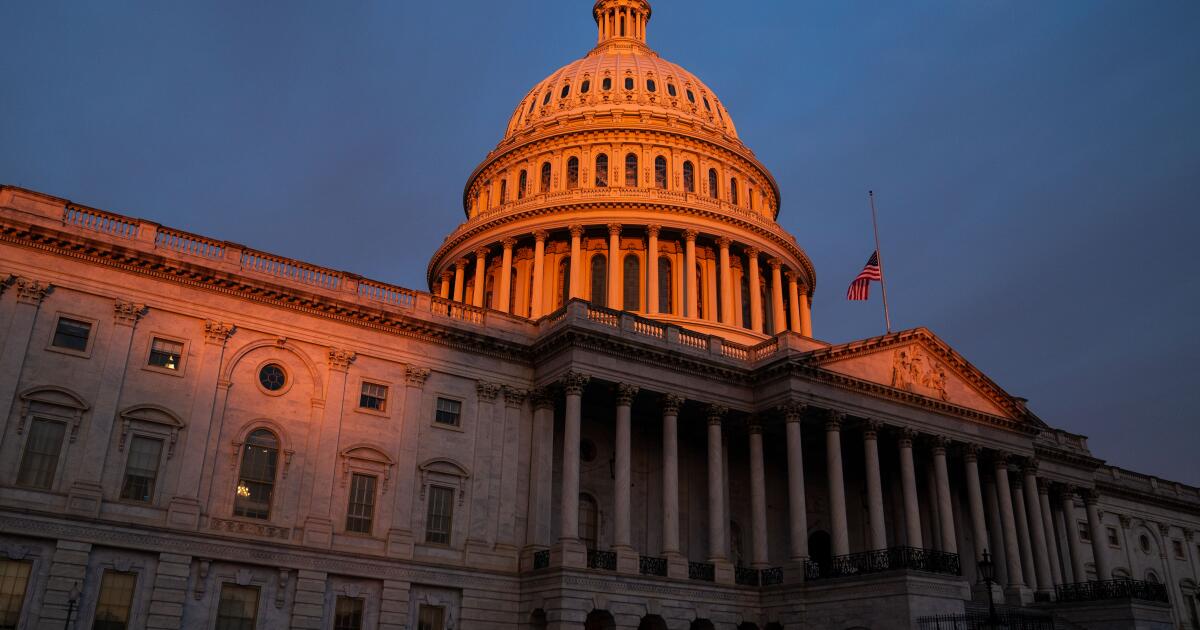SACRAMENTO — Regardless of all the campaign jabber, Proposition 50 is not about saving democracy, stopping power grabs or veering off the moral high road. It’s about which political party controls Congress.
Or whether Republicans and Democrats share the power.
It’s also about exerting some control over unhinged President Trump. That would happen if voters across America next year flip the House of Representatives from Republican to Democrat, ending one-party rule of the federal government. Proposition 50 could help do that.
Does an obedient Republican Congress continue to allow Trump to walk all over it? Or does a new Democrat-led House exercise its constitutional duty to provide checks and balances over the executive branch?
This is what’s potentially at stake in California’s special election on Nov. 4. And it’s mostly what has motivated political donors to kick in an astronomical $128 million so far for the fight.
But let’s back up.
For many decades, state legislators drew their own districts — gerrymandering them to blatantly help themselves and their party win elections. And with some creative hands from California’s House delegation, Sacramento’s lawmakers also gerrymandered congressional districts.
It was unethical but perfectly legal. The final straw came in 2001 when legislators of both parties conspired to draw districts that protected every incumbent, whether Democrat or Republican.
California voters finally had enough and in 2008 banned gerrymandering. They assigned legislative redistricting to an independent bipartisan citizens’ commission. In 2010, voters also gave the panel responsibility for drawing House seats.
It has worked great. Politicians no longer get to choose their own voters. And the districts have become much more competitive.
District maps have always been drawn at the beginning of each decade after the decennial census — until now.
This time, Trump got worried that Republicans could lose the House in next year’s elections — a fate that has often befallen a president’s party during a midterm.
So Trump pressured Texas Gov. Greg Abbott into orchestrating a mid-decade legislative gerrymandering of his state’s House districts, with the aim of gaining five more Republican seats. The president has also been browbeating other red states to rig their congressional lines.
California Gov. Gavin Newsom quickly retaliated. He asked an eager Democrat-controlled Legislature to draw up new House maps designed to gain five new Democratic seats, neutralizing Texas’ action.
Democrats already outnumber Republicans in the California House delegation, 43 to 9. In Texas, Republicans hold 25 of the 38 House seats. Nationally, Democrats need to gain just three seats to retake House control.
Unlike in Texas, Newsom needs the voters’ permission to resume gerrymandering. That’s what Proposition 50 does, along with granting voter approval of proposed new weird-looking congressional maps drawn by Democratic lawmakers.
How weird? To make a new 2nd District Democrat-friendly, it was stretched hundreds of miles from the rural northeastern Oregon border southwestward into the urban San Francisco Bay Area.
Under the ballot measure, the independent commission would resume redistricting in 2031 after the next census. Proposition 50’s opponents contend Democrats can’t be trusted to keep the gerrymandering temporary.
And they’re hypocritically screaming about a “Newsom power grab” — without also pointing the finger at Trump and Abbott, who started this fight.
At its core, this is a brawl over raw political power. Forget any idealism.
Longtime Republican operative Jon Fleischman mixed his party’s principal talking point with reality in a recent blog:
“Prop. 50 is a naked power grab by Gavin Newsom,” he wrote.
“If it passes, five of nine safe GOP House seats in California will flip to safe Democrat, potentially flipping the House next year.”
In trying to rally Democratic voters — who outnumber Republicans by nearly 2 to 1 in California — Newsom frames Proposition 50 as essential for democracy.
“It’s all at stake,” the governor asserts, sounding a bit hyperbolic. “This is a profound and consequential moment in American history. We can lose this republic if we do not assert ourselves … and stand guard for the republic and our democracy.”
Come on, our republic will survive regardless of what happens to Newsom’s gerrymandering proposal — even if Trump does strain democracy.
Proposition 50 also is opposed on idealistic grounds — particularly by former Gov. Arnold Schwarzenegger and wealthy GOP donor Charles Munger Jr. Both were strong backers of creating the independent redistricting commission. Munger has contributed $33 million to the anti-50 effort.
“Gerrymanders are a cancer and mid-decade gerrymanders are metastasis,” Munger wrote in a New York Times op-ed last month.
If Democratic politicians gerrymander California, he asserted, “then they lose the moral high ground.”
Well, if this is the moral high ground we’re living in under the Trump regime, I’d like to move to another level.
My definition of a moral high ground doesn’t include a Congress that won’t push back against a bully president who cuts back millions in research aid to universities because he doesn’t like what they teach, who sics his own masked police force of unidentified agents on California residents, who sabotages our anti-pollution programs.
Isra Ahmad, a member of the independent commission, noted in a recent Los Angeles Times opinion piece that “California has embraced [redistricting] equity and transparency while states like Texas entrench partisan advantage.”
And she asked: “Does taking the high road matter when your opponents are willing to play dirty?”
The answer: We should all play by the same rules — even if it unfortunately requires temporary gerrymandering. After Trump leaves, we can return to the high road.
What else you should be reading
The must-read: California voters were mailed inaccurate guides ahead of November special election
The interpersonal read: He’s a real pain for Gavin Newsom. And a rising Democratic star
The L.A. Times Special: In the biggest sex abuse settlement in U.S. history, some claim they were paid to sue
Until next week,
George Skelton
—
Was this newsletter forwarded to you? Sign up here to get it in your inbox.
